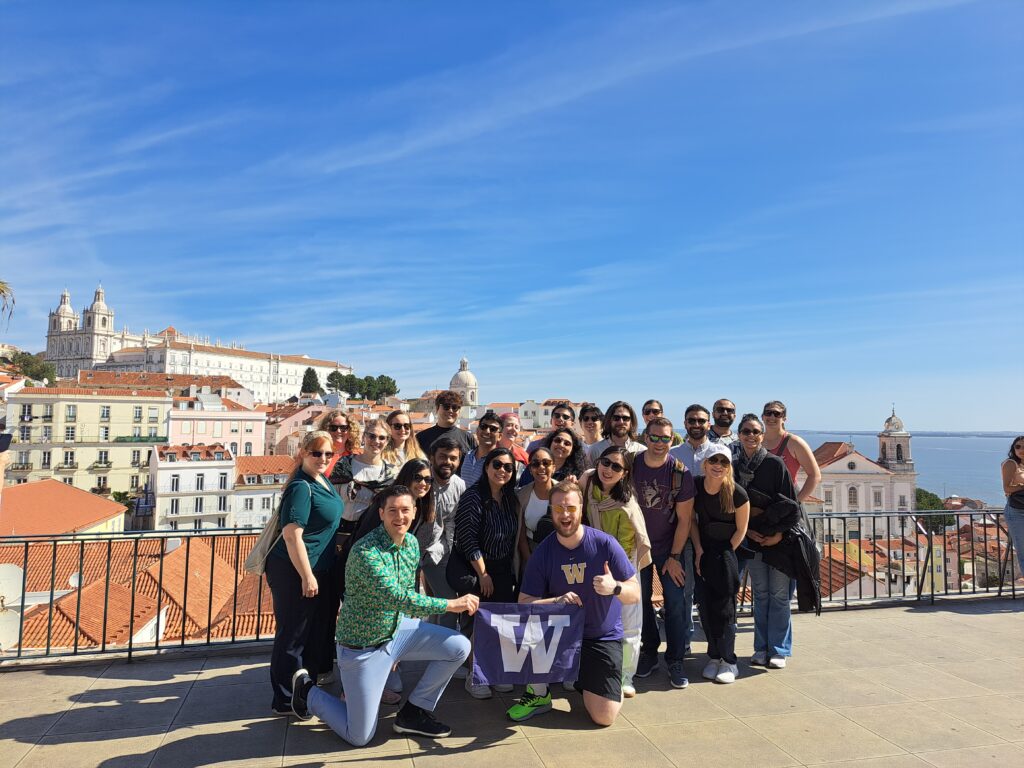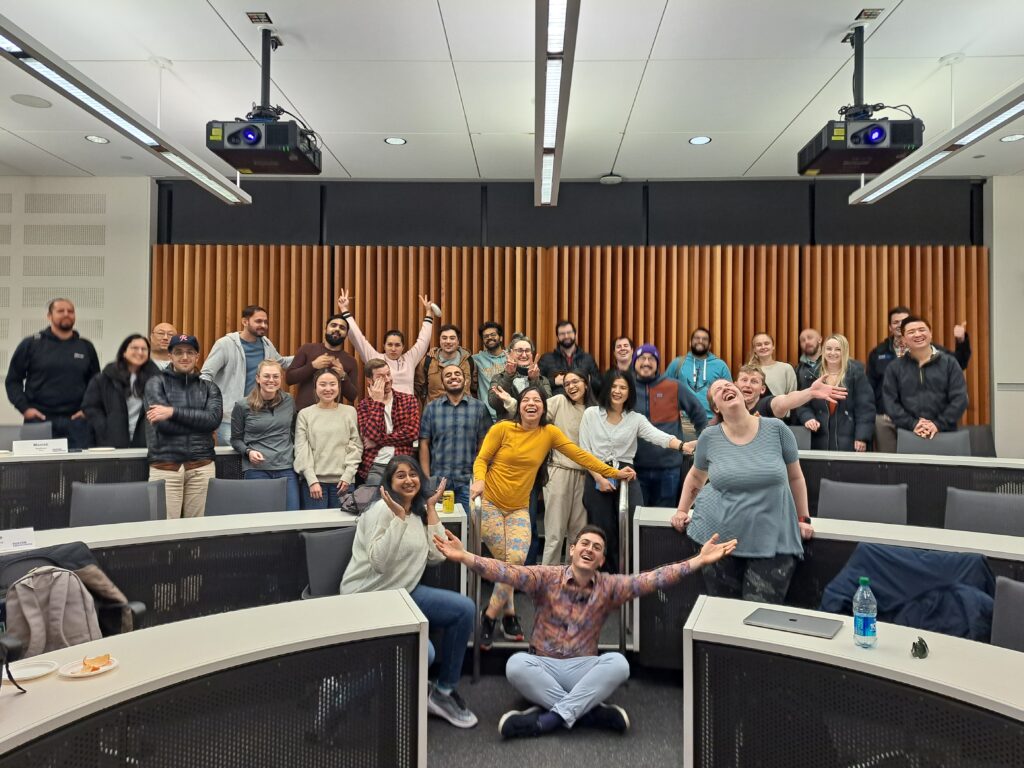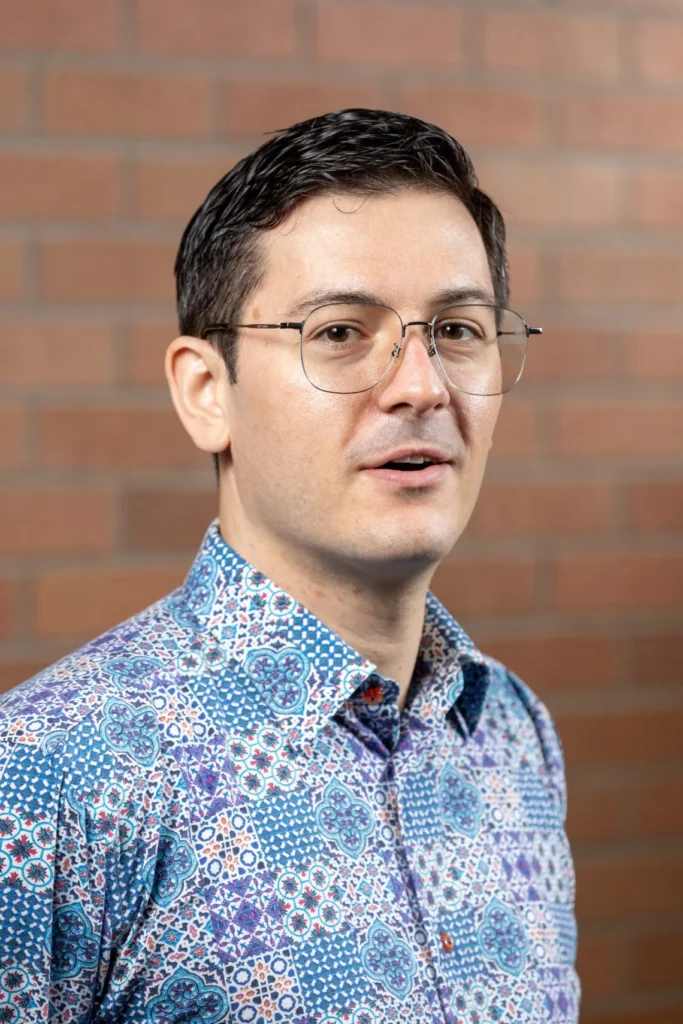Foster Management Faculty Spotlight – Andrew Hafenbrack
Get to know Andrew Hafenbrack, Associate Professor of Management and Organization and Evert McCabe Endowed Fellow at the University of Washington’s Foster School of Business. He teaches the elective courses negotiations and mindful decision making.
Please tell us a bit about your background.
I was born in Vancouver, WA, and grew up in the Bellevue/Issaquah, WA area from ages 3-18. I went to Carnegie Mellon in Pittsburgh for undergrad and majored in Decision Science and minored in Classical Vocal Music Performance (i.e., opera). I graduated from undergrad in the recession in 2009 and went straight to the PhD program a year later at INSEAD in France and then transferred a year after that to the Singapore campus. I spent eight months during the PhD program as a visiting student at Wharton. My first faculty position was at Catolica Lisbon in Portugal. I met my wife Heeso in Singapore and she is from Incheon, South Korea. My son Angelo is 7 years old. My daughter Lia is eight months old. My mother, father, step-mother, and brother all live in the greater Seattle area. My hobbies are playing music, playing soccer with my son, cooking, eating out, and gardening.
What excites you about your subject area and what are some of your research interests?
I am excited by my subject matter because it is hard and complicated to understand other people and to figure out what motivates and satisfies them. It can even be challenging to understand ourselves, which is often a precursor to being an effective and authentic leader. I became interested in mindfulness because it helped me manage my own stress levels during the PhD program, and then I was lucky that it rose in popularity in the corporate world as well at about the same time. Proponents of mindfulness thought it was more of a silver bullet than it really is, so it has been interesting to demystify some of those beliefs (despite being somewhat vilified in the process: https://www.youtube.com/watch?v=S5ddLeEVfvY). I am interested in cultural psychology because there are many benefits of connecting with people from many different backgrounds and that is the main message that my research has supported. However, there are also ways that culture can constrain people. We need to understand those constraints in order to do anything about them.
Which factors influenced your decision to join UW Foster?
I am from Seattle and most of my family lives in the area. The year I joined, the department I am in was the most productive department in the country based on contributions to top journals in our field, and we are virtually always in the top 10. It was really a no-brainer because this is a place that has the research culture I wanted while also being in my hometown so that I have family support in raising my two kids. Most people throughout the world do not have a business school this good in their hometown, and I am very lucky to have one and to have been hired by them.
What do you find meaningful about your time thus far at Foster? How does your work align with Foster’s purpose? Purpose statement: Together…We Foster Leaders; We Foster Insights; We Foster Progress…To Better Humanity
I like to think that my work has aligned with all of the tenets of our purpose statement. I teach a course on management and leadership. I develop and test new ideas and share them in the media. I prioritize teaching practices/materials and research ideas that create inclusion and psychological safety and push people to treat everyone with dignity and respect regardless of their background. As someone who is politically progressive, it is a relief to work at an organization where my personal beliefs are also aligned with the organizations’ purpose statement. This would not be the case at a lot of other business schools.
How have you worked to make your classroom/ course curriculum inclusive?
I have cared about inclusion for a long time. For example, I had taught the concept of identity through an inclusion lens since my first course in 2015. However, the horrifying George Floyd murder made me want to urgently do more to foster equity and inclusion. I read over a dozen relevant books written by women and people of color to better understand their life experiences and attempt to put myself at least a bit in their shoes. I increased the diversity of protagonists in my course materials, such as increasing the role of women and people of color in my stories, examples, and illustrations. I attended six sessions on DEI best practices at Foster and conferences. I attended several DEI CoP meetings, gave a presentation at a DEI CoP meeting, and updated my course readings in line with what I have been learning. I use name coach and introductory videos to avoid mispronouncing anyone’s name. I use random calls so all students can speak. I solicit feedback from students at multiple points in any course. I have a growth mindset in this domain and give additional participation points to students who challenge, contradict, or correct me. I give voice to uncomfortable and difficult topics in the classroom (e.g., how both men and women could prevent women from doing excessive “workplace housework”, how the police could change the way they think about Black people). I led an MBA study tour to Portugal in March 2023 to foster intercultural understanding.
Any favorite memories from your experience with Full-Time MBAs/Evening MBAs?
The best moments for me are when we are learning deeply but also enjoying the process. While I love my courses and have enjoyed a lot of the moments in class and our discussions and seeing students have epiphanies, I would be lying if I said my favorite experience was anything other than the Study Tour to Portugal with 28 MBA students. The theme was “what can we learn from Portuguese people about how to enjoy life, and how do organizations support that?” We had a lot of great meals and wines such as at the Quinta de Pacheca port winery in Douro Valley, saw many beautiful things like the Vista Alegre fine China hotel and museum near Aveiro, and explored how the political system supports people when we met with the Mayor of Lisbon. We stayed at only four or five star hotels and had at least seven group meals. We had nineteen different company or cultural visits (only twelve are required) so we definitely took the substance of the trip seriously from a learning standpoint, but it also was an amazing group of students and kind of felt like a big party. I am thrilled to have recently won the outstanding Evening MBA faculty service award, and most of the speech about why I got it (https://www.youtube.com/live/hVUYSvO9ZKs?feature=share&t=4631) had to do with this study tour.

How have you supported students outside the classroom?
I try to support students however I can. I have met with them to discuss personal or work problems. I have judged two case competitions. I have taught mock courses for admissions. I have given presentations to the Foster Insights event, Women in Business club, Wellness Club, and in the Students and Alumni lunch and learn series. I was interviewed for the Conversations on Careers and Professional Life Podcast. I went to the Challenge 4 Charity auction/dinner. I have been to all the MBA graduations and also joined MBA events such as Carnival, happy hours, and the song I sang was “auctioned off” at the karaoke boogaloo fundraiser. I organized and presented several times in the Academic Life Seminar for PhD students. I have given guest lectures to at least three courses that are taught by someone else.
How is your teaching influenced by instructional best practices? How do you maximize learning and keep students engaged?
I go to the Teaching Best Practices session at the beginning of each academic year and make adjustments based on what I learned. Some of the things I have learned include to use random call, to not ask any students to speak on behalf of a group they seem to belong to, how to address micro-aggressions or other “hot moments” in the classroom, and how to have an orientation towards making every student feel that they matter. I also go to sessions at conferences on DEI and teaching best practices. My pedagogical approach revolves around the five pillars of caring about students, variation in different tools and delivery formats, storytelling, extensive preparation, and fun. For me the most useful resource though is the students’ feedback in the course evaluations, which I tend to read multiple times and agonize over. The end goal is to have the students feel that they have learned useful insights in a way that they enjoyed and felt motivated to engage.
How have your relationships with industry experts influenced what happens in your class?
The experience of business leaders I meet and read about is often to balance out the research focus and serve as a sanity check to research findings I know about. I have taught executive education extensively and the main reason I like it is to hear the stories of business leaders and the challenges they face at work. I try to have a guest speaker at least once in my Evening MBA core course. I had a guest speaker once in my negotiation course too. I read books by business leaders and those inform the stories I tell and which insights to share. I feel like the main value I add is by creating a journey that I personally guide as someone who has been reading the research literature for almost two decades. I can summarize and synthesize what I think students need to know about a topic in an hour. Most of the time I think that is more of a useful thing to do than bring in a guest speaker, given that there are already so many fantastic interviews of business leaders on the internet.
How has your research influenced the curriculum at other business schools?
I have shared the materials of the mindful decision-making elective course I made and at least some of it has been taught in at least three other business schools. My articles have been on the syllabus as required reading for PhD courses at Columbia, Duke, University of Southern California, Copenhagen Business School, Johns Hopkins, and Waterloo University. The meditation recording we made for an article was also used in an MBA course at Rice and Washington University in St. Louis, as well as in the course I established at Catolica Lisbon. My students and I wrote a case that we published with INSEAD and is now sold on the Harvard Business Publishing website, so it is likely that it is also being used in class at other business schools.
Please tell us about the structure of your elective course. What can students expect to master by the end of it?
Mindful decision making helps us know ourselves and others better. What is going on underneath the surface when we make decisions? So, we focus on how people think, feel, decide, and behave. One overarching theme is the value of making things that are usually unconscious more conscious so that we have more data on which to make informed, intentional decisions, and/or we can process emotions more effectively so that they do not leak out in some other way in terms of self-sabotage or passive aggressiveness.
Negotiation is about the ways we can make deals with other people, especially when we initially disagree or have different interests/preferences, with an eye towards having everyone feel like they have won and want to continue working with each other.
Are there components of your elective that can help students build their resume?
One of the things that comes to mind is that at the end of my negotiation course, students vote on who deserves awards like best negotiator, most creative, and most collaborative. The winners and also the runners up can put this on their resumes.
Mindful decision making connects meditation and awareness with decisions and how to get along with other people. This is widely applicable in personal and professional life, especially for people who are stressed.
What advice do you have for students to ace your course?
Just do the preparation work, show up, be ready to question your assumptions, share your feelings and beliefs, and be open to what you can learn from others.


